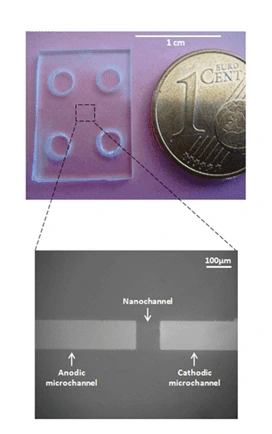Nanofluidic immunoassays to replace ELISA tests: Diflusel
This project aims to use new effects at the nanoscale to develop a universal device to selectively preconcentrate any molecules of interest by a factor of 1000 in just a few minutes.
This technology appears to be vastly more efficient than current ELISA immunoassays.
This project is completed now. If interested, feel free to contact us.
A nanofluidic system designed to replace ELISA immunoassays: introduction
An immunoassay is a biochemical test that detects and quantifies a particular analyte in a sample based on its ability to act as an antigen.
Enzyme-linked immunosorbent assays (ELISA) rely on an antibody’s innate capacity to bind to a molecule’s unique structure.
The Diflusel project aims to design and study a novel immunoassay device based on a new method of selective electro-preconcentration with fluidic chips bearing a nanochannel.
Academic research and published results have already demonstrated that preconcentration regimes could be controlled by introducing a nanochannel in fluidic chips.
However, the location of the preconcentration strongly depends on the mobility of the analyte under the electric field.

A nanofluidic system designed to replace ELISA immunoassays: project description
To obtain selectivity, we propose a novel preconcentration methodology in this project that uses additional hydrodynamic pressure to ideally monitor the competition between electrophoretic and electro-osmotic flows. This new electro-preconcentration method enables an exact adjustment of the location of the different pre-concentrated analytes.
Selectivity is reached because the preconcentration and separation of the analytes are obtained in one single step.
Since these micro-nanofluidic devices offer a fast preconcentration time of around one minute, this new methodology is a real breakthrough compared to conventional ELISA immunoassays.
Our recent experimental results confirm that this additional pressure significantly improves the preconcentration rate. The purpose of the DIFLUSEL project will be to demonstrate that the limit of detection (LOD) can be 100 times lower than the LOD of conventional immunoassays. Thus, pathogenic analytes at deficient concentrations in the femtomolar regime should be detected based on this new methodology.
This project will have critical practical applications for defense and civil applications, such as medical diagnostics.
This project is ongoing through a partnership between the Microfluidics Innovation Center and an academic group specialized in nanofluidics (LPN CNRS).
This project was funded by the French National Research Agency (Agence Nationale de la Recherche, ANR) under the No ANR13-ASTR-0035 (Diflusel).
